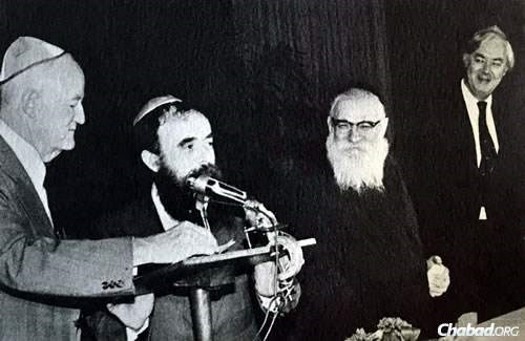
Rabbi Takes to the Radio, Offering Insight Through the Generations
Radio has always been something of a family affair. Long before the advent of television, radio—the original electronic medium—brought together listeners for all kinds of programs, including news for adults and entertainment for children. It also ran specifically Jewish content, with one extended family of rabbis drawn to the medium over generations: the Hechts.
It all started with Rabbi Solomon S. Hecht, whose post-World War II radio programs in English and Yiddish conjure up associations of war-era newscasts. Yet beyond the clipped inflection and nasal pitch, the content is entirely different.
Rather than bombs, aircraft, enemies and submarines, these recordings transport listeners to a world of Chassidic Rebbes, Torah insights, and the string- and horn-heavy Chassidic music of that time period.
In the years between Hecht’s arrival in Chicago at the age of 25 in 1942 and his untimely passing at the age of 62 in 1979, he hosted no less than four regular programs: “Way of Life,” “Torah in the Home,” Di Velt Derzeilt (‘The World Tells’)” and his popular Friday feature, “Shabbat Shalom.”
Speaking to the audience—referring to listeners as “my dear radio friends”—the rabbi filled his shows with relevant information on upcoming holidays, Jewish history, timely lessons and, of course, stories.
Cynthia (Tzivia) Moscowitz remembers the deep impression those early-1950s’ Friday shows made on her at the time. “Rabbi Hecht had a wonderful commanding voice, and he was very inspiring. When he spoke, you listened,” says the retired schoolteacher in a phone interview from Florida. “His programs were very popular with all kinds of Jews and even non-Jews. I remember my principal telling me that his mother would listen regularly to the Yiddish programs—and she was by no means religious.”
Though he was born in New York to American parents, the rabbi studied in Israel and Europe in his youth, and spoke impeccable Yiddish with an authentic accent. In fact, for a time, his Yiddish-story programs were taped and rebroadcast in Israel.
The rabbi had been sent by the Previous Rebbe—Rabbi Yosef Yitzchak Schneersohn, of righteous memory—to serve the needs of Chicago Jewry. When he arrived, he took leadership of the Anshei Lubavitch synagogue, then celebrating its 50th anniversary.
The Rebbe had recently arrived on the shores of the United States in the winter of 1940, having narrowly escaped war-torn Poland. Almost immediately, he began dispatching young rabbis to communities across the nation with the mandate to bolster Jewish observance and engagement.
“Rabbi Hecht’s arrival stirred much interest,” recalls Moscowitz’s husband, Ephraim. “With a full beard, wearing a long frock coat and speaking perfect Yiddish, people were surprised to learn that he was American-born. With his charisma and regal appearance, he attracted a following of young adults into his Torah classes.”
Many of the advertisements on his radio program reflected the rabbi’s far-reaching efforts to bolster all facets of Jewish life in the “Windy City.” A regular sponsor was the Tel Aviv Bakery, then the only shomer Shabbos bakery in Chicago, which the rabbi worked hard to have established.
After the rabbi’s sudden passing, the Moscowitzes’ son—the late Rabbi Daniel Moscowitz, who succeeded Hecht as head shaliach (Chabad emissary) to Illinois—would continue the tradition with a weekly radio program on Fridays called “Lichvod Shabbat (‘In Honor of Shabbat’).”
Segments, Stories and More
Some 800 miles to the East in New York, Hecht’s younger brother—Rabbi J.J. Hecht—also plied the microphone every Friday, beginning with a Yiddish-language program that extended to include a Sunday English segment and more.
The radio show—called “Shema Yisrael (‘Hear O Israel’)”—was sponsored by Anti Shmad, the branch of the NCFJE (National Committee for the Furtherance of Jewish Education) that combatted Christian missionary groups targeting uneducated Jews.
His Friday segment was the first of a string of rabbinical messages that would follow every Friday morning on WEVD, which once belonged to The Jewish Daily Forward and was largely viewed as New York’s “Jewish” station.
While the Friday program was a time for Torah thoughts and sharing the laws pertaining to upcoming Jewish holidays, Sunday afternoon was often dedicated to interviewing elected political and administrative officials, in addition to other guests.
Over the years, the format changed. At one point in the 1970s, Hecht would tell Jewish-themed bedtime stories for children three nights a week. In fact, his son, Rabbi Shimon Hecht, recalls listening to the stories over the radio in his father’s car—and “that was how I got to hear bedtime stories from my father,” he says.
Another segment was called “With Jewish Youth” and served as a forum for young people who had re-established their connection to traditional Judaism to share their experiences.
In the 1980s, a third brother, Rabbi Abraham Hecht—rabbi of Congregation Shaare Zion of Brooklyn, N.Y., the largest Sephardic congregation in North America—also hosted a program interviewing rabbis on a variety of subjects.
The Next Generation…
After Rabbi J.J. Hecht passed away in 1993, his son Rabbi Shea Hecht took over his father’s Sunday radio spot.
The younger Rabbi Hecht experimented with other forums as well, including co-hosting a morning drive show with author, journalist and publisher Karen Hunter, and an afternoon drive show on WWRL with poet and media personality Felipe Luciano. His latest endeavor is a weekly show on relationships, carried by Israel National Radio and streamed over the Internet.
After six decades, the radio bug has yet to leave the Hecht family, despite the fact that the medium seems to be in a state of slow decline as electronic media takes an increasingly large piece of the entertainment and information pie. In recent years, Rabbi Shea Hecht’s sons Hanoch Hecht and Yitzchok Hecht have started their own programs in Upstate New York, taking up the mantle of a family tradition that’s affected so many avid audiophiles.















wow
those were the days…beautiful piece thanks
and now
Daniel Moscowitz daughter is married to Hecht great nephew.Maybe they can continue the chain.
dont forget the legacy of Rabbi Wineberg tanya show.
nephew
Uncle shlome, What a special dignified person he was!